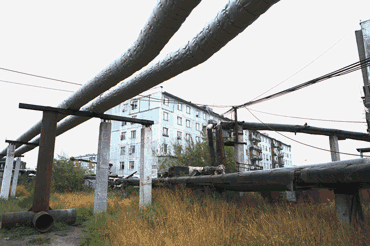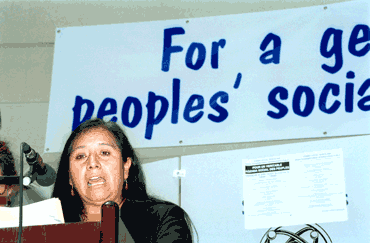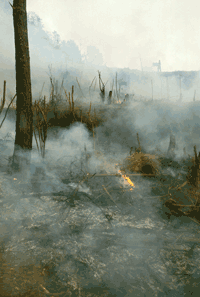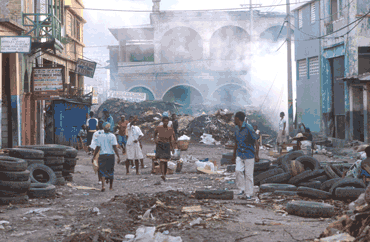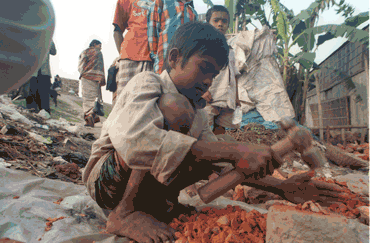
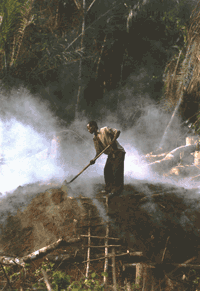 A Liberian farmer produces charcoal for market through the burning of palm trees (WCC/Jonas Ekströmer) "Justice is the heart of the matter. It is the key to the realization of human dignity and development within secure and sustainable communities. Such communities require a just and moral economy where people are empowered to participate in decisions affecting their lives, and where public and private institutions are held accountable for the social and environmental consequences of their operations. Justice demands the transformation of global economic governance and the international financial system so that their institutions are accountable to and serve all people, not simply the wealthy and powerful." Extract from a statement "Staying Engaged - for Justice" by the ecumenical team to the 4th Preparatory Committee of Financing for Development, January 2002 "This [neo-liberal economic] model holds out no real hope for eliminating or even reducing poverty, but rather continues to exacerbate it. It increases inequality and excludes communities around the world... The WCC flatly rejects such economic models as being contrary to the notion of economic equity sought by Christians." Extract from a WCC statement on the Monterrey Consensus Document to be adopted at the International Financing for Development conference, Monterrey, March 2002 "Globalization in the Pacific is like a tidal wave that strikes with a powerful force, dominates and suppresses developing new forms of life." Extract from Pacific churches contribution on alternatives to economic globalization; from a meeting in Fiji, 28-30 May, preparing for a global consultation in Nadi, Fiji, 12-17 August 2001 Press release  The public face of globalization is displayed in Bucharest, Romania (WCC/Peter Williams) "Communism depended on unrestricted state planning. Consequently, the unrestrained market mechanism was welcomed by many politicians and social leaders as the path to a better future. They neglected to understand that a market without a social, cultural and institutional framework is bound to fail and destroy the social fabric of society." Extract from a message on globalization from a June 2001 consultation on economic globalization in Central and Eastern Europe Press release "There is growing social consciousness among peoples' movements and even world leaders that the process of economic globalization needs to be regulated. The church has an important role in providing theological and ethical insights in support of the peoples marginalized and excluded by economic globalization." Rogate Mshana at a global ecumenical consultation in Fiji, 12-16 August 2001, on the devastating effects of economic globalization on national and regional economies Press release "One of the ecumenical movement's mandates is to be in solidarity with the poor; a clear response to the great commission given us by Jesus Christ to preach the good news to the poor, the good news that sets the captives free and proclaims the year of the Lord. Wherever forces of darkness, of death, have threatened life, the ecumenical movement has stood up to condemn, to speak and act against. In this particular moment, one of the manifestations of the forces of death to humanity, to life in its wholeness, is precisely the way economic management is being undertaken globally."
|
YEARBOOK 2002: ASPECTS OF GLOBALIZATION In 2001, the World Council of Churches (WCC) continued its ongoing effort to counter what it identifies as harmful aspects of economic globalization. In particular, it called attention to effects on the more impoverished sectors of the world population that lack access to advanced technologies. As Konrad Raiser, general secretary of the WCC, has written in a forthcoming book on transforming globalization and violence, "Responding to globalization and overcoming violence are two of the focal points in the present activities of the Council." He added that the search for a "culture of life" had "been running through most of the recent efforts to articulate again the ecumenical vision in an age of globalization". The Justice, Peace and Creation team of the WCC has been active in producing materials to help the churches study contemporary processes of economic globalization and to explore alternatives. According to one of their booklets published in 2001, financial institutions, particularly the World Bank and the International Monetary Fund (IMF), have shown an interest in dialogue with churches and other concerned groups worldwide. The WCC publication warns that any churches engaging in dialogue must have "skills in detecting the traps and temptations inherent in the policies implemented by the World Bank and the IMF". The October 2001 issue of the WCC periodical The Ecumenical Review dealt with "The Impact of Globalization on Eastern/Central Europe". At the same time, a policy paper on "Economic Globalization: A Critical View and an Alternative Vision" was prepared for publication early in 2002. Among the places the WCC has identified damage done by the international financial institutions is Zimbabwe. In dealing with the overall situation there, a resolution by the WCC executive committee at its Geneva meeting in September observed that "structural adjustments" imposed by such institutions hurt the people of Zimbabwe by "further undermining the social welfare system and public health services at a time when the HIV/AIDS pandemic had already stretched it to the limits".
Another forum where the WCC has worked to offset the negative effects of globalization has been the United Nations (UN). In recent years the UN liaison office of the WCC in New York has enlisted individuals from many churches and countries to serve on ecumenical teams at international conferences and preparatory committee meetings. In October 2001, an ecumenical team went to New York to follow preparatory work for the International Conference on Financing for Development, held in March 2002 at Monterrey, Mexico. Talking with government delegates, reporters and representatives of other non-governmental organizations, team members emphasized that justice was "the heart of the matter", not monetary policy. The United Nations rather than the IMF and the World Bank should be taking the lead on economic issues, they said. Current models of development should be subjected to criticism because "a moral vision calls for full participation of all communities, especially those marginalized by poverty and disempowerment", the team said. Rogate Mshana and Martin Robra of the WCC team on Justice, Peace and Creation reported that in the effort of the churches to counter globalization's force, thinking on ecology, social justice and economics has become increasingly integrated. The question for the churches, they said, is how to develop just and sustainable communities that enable people to live in dignity. Within its climate change programme, the WCC continued to participate in negotiations around the UN Framework Convention on Climate Change. After the failure of negotiations in The Hague in November 2000 (COP6), the central committee meeting in Potsdam, Berlin, in January 2001 reaffirmed the WCC's policy that "industrialized countries bear the major responsibility for precipitating climate change and therefore must exercise leadership that results in real action to reduce the causes." There was much disappointment when, in March 2001, the United States of America withdrew from the Kyoto Protocol process. The WCC issued a press release at the time describing the move by the Bush administration as a "betrayal of their responsibilities as global citizens". At a further set of negotiations (COP6b) in Bonn in July 2001 attended by a WCC delegation, all countries except the United States reached a political agreement on guidelines for implementing the Kyoto Protocol. The WCC welcomed this sign of progress.
At a subsequent meeting (COP7) held in Marrakech, Morocco, in November 2001, the WCC sponsored a day-long, inter-religious colloquium to explore Christian and Islamic perspectives on climate change. David Hallman, coordinator of the WCC programme on climate change, said at the time, "I think it is very significant that we, Christian and Muslim, are here together discussing a subject that concerns us - the effects of climate change on our world." In late November 2001, the WCC hosted a consultation on "solidarity with victims of climate change" that explored the impacts of increasingly extreme weather events caused by human-induced climate change, and the implications of this for ecumenical relief and development agencies. The consultation produced a concise and challenging statement which is available through the WCC web site. The year ended with the formulation of plans for the World Summit on Sustainable Development in Johannesburg, South Africa, September 2002. The ecumenical team following the UN's preparatory committees for the conference has challenged the concept of sustainable development. Echoing the WCC's eighth assembly in Harare which called for the dangers in current patterns of globalization to be countered with a focus on "just and sustainable communities", they insisted that ecological and social aspects, as well as economic, be considered within their essential, ethical dimensions. "There needs to be a shift in perspective and of the economic paradigm," said Martin Robra of the JPC team. "Defending the earth is not a project. Defending the earth is a way of life," he said.
While many people have given attention to the problem of poor countries struggling with levels of international debt they cannot handle, the WCC contends the issue of debt must be seen as only one part in a larger puzzle. Its solution will require fundamental change in the international system. WCC member churches reacting to the challenge of globalization held a series of conferences and consultations on the subject in 2001, including one in the Pacific region in May, one in Hungary in June and one in Fiji in August. In November, the WCC joined with the Christian Conference of Asia to hold a consultation in Bangkok on the needs of children in Asia. In a communiqué, participants said "the negative impact of globalization" had in significant ways "added to the present miseries of Asian children".
|
||
